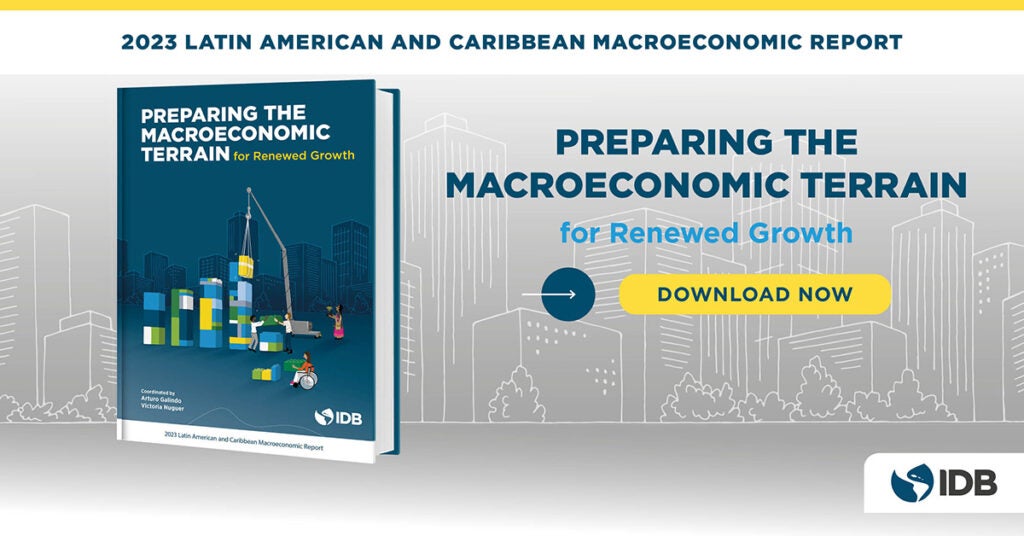
This article is part of an effort to make the concepts of our Latin American and Caribbean Macroeconomic Report, which at first sight may seem complex, more accessible to the general public.
To explain what the drop in GDP suffered by Latin America and the Caribbean in 2020 as a result of the pandemic means in practical terms, Eric Parrado, Chief Economist and General Manager of the Research Department of the Inter-American Development Bank (IDB), uses a very clear metaphor: “It’s as if your salary fell by 7%.”
Seen this way, it is easy to understand the impact of this crisis on the region, and the need to get back on a path of sustainable economic growth, which is the central theme of the IDB report Preparing the Macroeconomic Terrain for Renewed Growth, which Parrado recently presented at the IDB’s Annual Meeting.
The report presents the main challenges facing the region today:
- First, there is the social challenge. With about 18% of the population living on about US$3 per day, poverty levels in the region are higher than they were a decade ago, and inequality has grown. The pandemic increased poverty in the region and, recently, Russia’s war on Ukraine has made it even more difficult to make up for lost gains.
- Second, there’s the fiscal challenge. Following the impact of the COVID-19 pandemic, the region’s sovereign debt exceeded 70% of GDP and, although fiscal consolidation is still possible, many risks persist.
- Third is low productivity and, consequently, lower long-term average economic growth, which is currently estimated at only 2%, insufficient to achieve the development objectives of most countries.
Following the presentation of the report, Eric Parrado spoke with Ángela Funez, IDB Lead Communications Specialist, about the main findings.
The first thing I would like to ask you is, what are the main outcomes that this report seeks to communicate?
This reportgives the economic outlook for Latin America and the Caribbean and its importance for households and businesses. How will prices grow? How will activity pick up? What will employment look like? What we do is identify inflationary, fiscal, and financial risks that ultimately affect your day-to-day life when you have a job, when you send a child to school, when you have to try to learn something new in order to get a job.
Sometimes we see big headlines on growth figures, but the average person or any of us who read them don’t know how they relate to our household economy. To begin with, what is the GDP projection and how is it going to impact families, especially the most vulnerable ones?
GDP is a measure of economic activity. It stands for gross domestic product, which is a measure of income. Just as we have a salary, countries have economic activity. And in a way, that income at the national level is measured through gross domestic product. So, for example, when COVID-19 hit us and the shock was quite strong, that income fell by 7%. That’s as if your salary were to fall by 7%, which is a considerable amount. We then bounced back by another 7% in 2021. But that did not compensate for the drop, because the base was lower. And the projection we have for 2023 is only slight growth of 1%. This is quite small, because our region’s development needs in terms of education, health, and infrastructure go far beyond that percentage. The potential we have is great. We deserve a much higher growth rate.
How is the growth rate connected to inflation? What are the variables that explain why we are going to grow so little?
Well, one of the most important explanations in terms of low growth is that central banks made an effort to curb inflation by increasing interest rates. And that obviously has an impact on economic activity. That is why today we are growing less than we expected before, because what many countries and central banks did was precisely to raise the cost of money, which is the interest rate, to try to curb inflation.
Why would raising the interest rate result in lower inflation?
Inflation is measured, for example, by a basket of goods and services. And that basket has prices. I imagine you have heard of the CPI, the consumer price index, which is a representative basket of what you consume: food, groceries, rent, transportation, entertainment, etcetera. Inflation is the generalized increase of all these prices over time. What we had last year was a peak of 10% inflation. What does that mean for workers? Wages are more or less fixed and do not increase as frequently with inflation. In other words, you lost purchasing power because what you can buy today is much more expensive.

If you had US$100, for example, with 10% inflation, it’s like you only have US$90 now, right?
Exactly, you can buy fewer goods. Inflation is ultimately a very regressive tax because poorer people have greater exposure. For example, food prices have risen sharply. They have risen almost twice as fast, 20% in one year. The IDB therefore warns that there is a food security problem because many poorer segments of the population, given the increase in prices, find it more difficult to access food. That is why central banks, in an attempt to combat inflation, have increased interest rates, which is the cost of money. Why? Because many people are going to decide: “OK, either I spend or I get into debt at a higher interest rate, or I save it.” These are savings and spending decisions. And that helps you lower the inflation rate.
Public debt is a dry subject. We read about it in the newspapers, but it is difficult to see how it relates directly to family budgets. How does that relationship work?
Public debt is a country’s debt. Governments took on debt to try to spend more and offset the negative effects of the pandemic. The same is true for families. If, for example, a family member becomes unemployed, or falls ill, one does everything possible to help him or her. You take out a loan to help them get ahead and when they’re recovered, you can pay off the debt over time. The same is true for companies and countries. Therefore, debt should not be demonized, we should not aim for “zero debt.” Debt should be used well, for example, for education or buying a home. What the report says is simply that there must be an exit plan for repaying debts and their dividends.
Like when you have a credit card with an interest rate of, for example, 20% and then you have to figure out how to repay that debt or refinance it.
At the end of the day, what you want is to have a level of indebtedness and a monthly payment in line with your salary. When you are over-indebted, you get into trouble, because it is difficult to make the payments. It is simply a matter of taking on a prudent amount of debt over the long term. This works for countries, for companies, and for families.
The region has also been struggling with low productivity. What does the report say about this issue? How can productivity be improved?
In general, when we talk about the challenges facing the region, there are social challenges and there are fiscal challenges. But one of the most important challenges facing the region today is growth, and long-term growth is associated with productivity. That is, how can we do better with what we have? And that means education, innovation, thinking differently in order to be able to contribute much more in terms of income, with what we have now.
And “what we have” includes people, natural resources, all assets.
Exactly. And that is why all these technological innovations are so important: Because with more or less equal factors of production, we can grow much more and we can have higher incomes. And this results in higher country and personal incomes. This is the challenge we face today as a region.
I want to go back to that 1% projected growth for this year. How worrisome is that?
We must try to see the glass as half full. The region has a wealth of opportunities, natural resources, first-class human capital, and long-term commitments. We need to come to an agreement, a national consensus, dialogue, talk to each other to reach an understanding on a long-term plan.
And it is very important to tell families about the importance of saving. Saving is crucial, isn’t it? How much does a family have to save?
In general, there is no magic number, but you can always make an effort to save. For one thing, as we have already discussed, you can face unforeseen events like an illness or unemployment, but for another thing, saving means investment. One saves to invest, to improve education, to innovate. Therefore, one of countries’ main focuses should be not just to borrow well, but also to save well.


Leave a Reply